Butter Blocks Market Summary
The global butter blocks market size was valued at $32.4 billion in 2022, and is projected to reach $45.2 billion by 2032, growing at a CAGR of 3.4% from 2023 to 2032. The butter blocks industry comprises of the production, distribution, and consumption of butter in solid block form, catering to various culinary and dietary preferences.
Key Market Trends and Insights
Region wise, Asia-Pacific generated the highest revenue in 2022.
The global butter blocks market share was dominated by the baking segment in 2022 and is expected to maintain its dominance in the upcoming years
The supermarkets/hypermarkets segment is expected to witness the highest growth during the forecast
Market Size & Forecast
- 2022 Market Size: USD 32.4 Billion
- 2032 Projected Market Size: USD 45.2 Billion
- Compound Annual Growth Rate (CAGR) (2023-2032): 3.4%
- Asia-Pacific: Generated the highest revenue in 2022
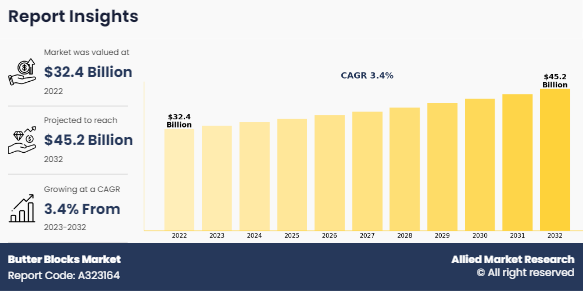
Key Takeaways
- Based on type, the salted sub-segment emerged as the global leader in 2022 and the unsalted sub-segment is anticipated to be the fastest growing during the forecast period.
- Based on application, the baking sub-segment emerged as the global leader in 2022 and is predicted to show the fastest growth in the upcoming years.
- Based on distribution channel, the supermarkets/hypermarkets sub-segment emerged as the global leader in 2022 and the online stores sub-segment is predicted to show the fastest growth in the upcoming years.
- Based on region, Asia-Pacific registered the highest butter blocks market share in 2022 and is projected to maintain its position during the forecast period.
Market Dynamics
Butter blocks are typically manufactured by churning cream, resulting in a solid product that contains varying proportions of butterfat, water, and milk solids. These blocks are widely used in cooking, baking, and as a condiment, offering a rich and creamy flavor profile that enhances a wide range of dishes.
Butter blocks are majorly produced by both traditional and artisanal butter producers, each offering unique products tailored to different consumer preferences. Traditional butter blocks are commonly made using cream sourced from dairy farms, with the final product often standardized to contain around 80% butterfat. However, artisanal producers offer butter blocks with higher butterfat percentages, resembling European-style butter known for their rich flavor and texture. The butter blocks market demand is influenced by various factors, including consumer preferences, culinary trends, and the availability of specialty ingredients.
Consumers increasingly seek high-quality butter options that offer superior taste and nutritional benefits, driving the market for premium butter blocks made from grass-fed cream or featuring unique flavor profiles infused with herbs, spices, or ethnic influences. Furthermore, the globalization of food markets has expanded the scope of the butter blocks industry, providing opportunities for producers to innovate and differentiate their products. With access to international cuisines and ingredients, butter block manufacturers are developing innovative flavors and formulations to cater to diverse consumer tastes and preferences. These factors are anticipated to drive the butter blocks market growth in the upcoming years.
However, the negative impact of butter consumption on cholesterol levels and blood circulation raises concerns about its use in high quantities. High levels of saturated fats in butter are known to elevate levels of bad low-density lipoprotein (LDL) cholesterol, increasing the risk of cardiovascular diseases and arterial calcification. This leads health-conscious consumers to avoid butter blocks altogether. Furthermore, individuals sensitive to milk allergies majorly experience throat infections and other discomforts from excessive butter consumption, further deterring them from purchasing butter products.
Thus, the health-related restraints associated with butter consumption present significant challenges for the butter market, which is anticipated to negatively impact the butter blocks market growth. As consumers become increasingly health-conscious and seek alternatives to high-fat products, butter blocks may face declining demand in the upcoming years, necessitating innovation and diversification within the industry to adapt to changing consumer preferences and health concerns.
In recent years, there has been a growing emphasis on the quality and origin of butter, with consumers showing a preference for products made from ethically sourced ingredients and traditional production methods. This trend has led to the rise of artisanal butter producers who prioritize quality and craftsmanship, offering consumers a premium alternative to mass-produced butter blocks. For instance, increasing demand for natural and authentic food products as consumers prioritize minimally processed options, butter blocks, made from simple ingredients like milk or cream, align perfectly with this preference for authenticity. Furthermore, the popularity of butter in both baking and cooking also provides a promising opportunity for butter blocks market expansion.
Butter's versatility in enhancing the flavor and texture of a wide range of dishes appeals to home cooks and professional chefs, making it a staple ingredient in kitchens worldwide. Also, the convenience of shelf-stable dairy products, including butter blocks, meets the needs of modern consumers seeking longer shelf life and easy storage options. This convenience factor contributes to sustained demand and presents an opportunity for manufacturers to innovate in packaging and product formats. Hence, the growing demand for natural, versatile, and high-quality food products is anticipated to have a positive impact on the butter blocks market opportunities during the forecast period.
Segment Overview
The butter blocks market segmentation is provided based on the Distribution Channel, Type and Application.
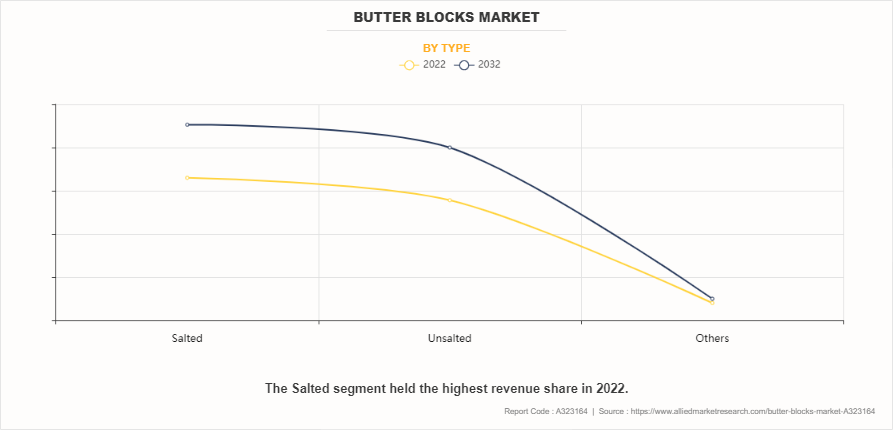
By type, the salted sub-segment dominated the global butter blocks market size in 2022. Salted butter is recognized for its potential health benefits. It contains essential nutrients such as calcium, vitamin K2, and vitamin D, which are crucial for maintaining bone health and promoting dental health. In addition, the presence of unsaturated fatty acids and antioxidants in salted butter may contribute to enhancing the immune system and protecting against certain diseases. In addition, salted butter enhances dishes with its savory flavor, which transforms ordinary meals into culinary delights. Ideal for spreading on bread or topping vegetables, its distinct taste enhances various recipes, making it a preferred choice among cooks.
Moreover, salted butter offers skincare benefits, nourishing the skin, nails, and hair. Packed with essential nutrients such as vitamins & minerals, it enhances blood circulation to the scalp, fostering hair growth and imparting a radiant glow to the skin. This dual functionality makes salted butter a versatile and cherished ingredient in kitchens and beauty routines. These factors are anticipated to have a positive impact on the salted butter blocks market during the forecast years.
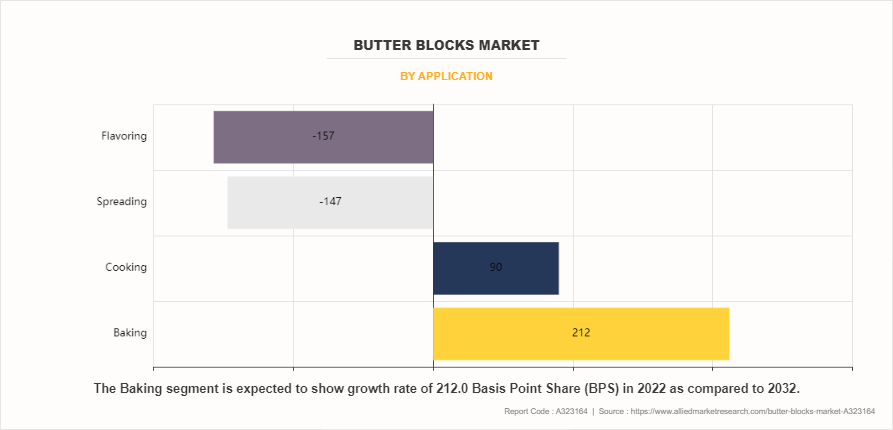
By application, the baking sub-segment dominated the global butter blocks market in 2022. Butter is a crucial ingredient in baking due to several reasons. Firstly, they contribute to the texture and moisture of baked goods, making them tender and moist. Moreover, butter blocks play a key role in the leavening process of baked goods. Through techniques like creaming, air is incorporated into the butter and sugar mixture, creating a light and fluffy base for cakes and pastries. The solid fat in butter also provides stability, helping cookies and biscuits maintain their shape during baking.
Also, temperature control is essential when using butter blocks in baking. Whether softened for creaming, chilled for pastry doughs, or melted for dense treats, the consistency of butter affects the final outcome of the baked goods. Each form of butter lends itself to specific techniques, allowing bakers to achieve optimal results. In addition, butter blocks serve as a versatile ingredient for flavor infusion and experimentation. From savory herb-infused butter to sweet vanilla bean butter, the possibilities are endless. This versatility inspires innovation in baking, pushing the boundaries of traditional recipes and allowing for endless creativity.
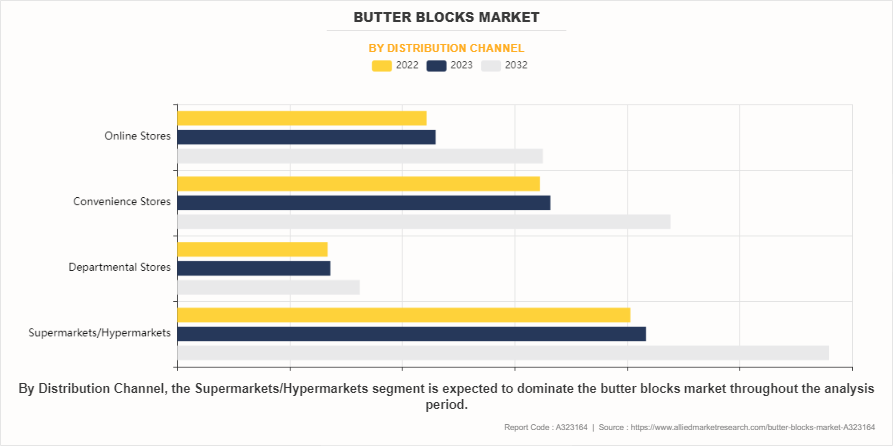
By distribution channel, the hypermarkets/supermarkets sub-segment dominated the global butter blocks market in 2022. Hypermarkets/supermarkets are popular choices for buying butter blocks due to various factors such as competitive pricing, convenience, and ease of accessibility. For instance, hypermarkets/supermarkets often provide competitive pricing on butter blocks compared to other retailers. With their focus on offering products at discounted prices and adopting a high-volume, low-margin sales model, these stores attract budget-conscious consumers looking to save on their grocery expenses.
In addition, the quality assurance and reputation of hypermarkets and supermarkets instill confidence in customers regarding the freshness and authenticity of the butter blocks they purchase. These retail giants often source their dairy products from reputable suppliers, ensuring high standards of quality and freshness.
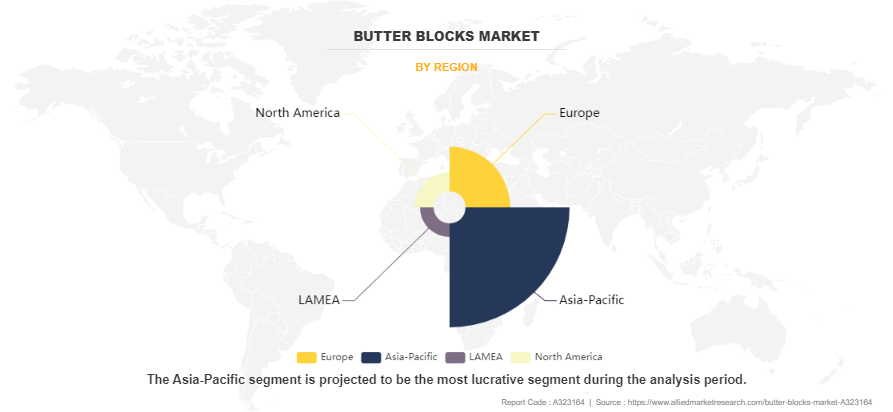
By region, Asia-Pacific dominated the global butter blocks market in 2022. Butter blocks plays a major role in enhancing the taste and flavor of various dishes and culinary items. In addition, butter holds symbolic significance in various rituals and celebrations across Asian countries. In some cultures, butter is offered as a sacred offering in religious ceremonies, symbolizing purity, abundance, and prosperity. In addition, butter is often used in festive dishes prepared for special occasions and celebrations such as Diwali, further ingraining its importance in Asian culinary traditions.
Nutritionally, butter is valued for its rich fat content, which provides energy and satiety, making it a staple in many diets. Furthermore, butter is believed to have health benefits in moderation, containing essential fatty acids and fat-soluble vitamins that contribute to overall well-being. Overall, the widespread consumption of butter blocks in Asian countries can be attributed to their culinary versatility, cultural significance, and nutritional value.
Competitive Analysis
The key players profiled in butter blocks market report include Fonterra Co-operative Group Limited Lactalis Group, Danone S.A., Nestlé S.A., Arla Foods amba, Kerry Group, Land O'Lakes, Inc., Dean Foods, FrieslandCampina, Megmilk Snow Brand Co., Ltd., and Grassland Dairy Products, Inc. Acquisition, product advancement, partnership, and business expansion are the key strategies adopted by the market players. For instance, in October 2023, iD Fresh Food unveiled its latest innovation, the iD Twist and Spread Butterstick, designed to simplify the task of spreading butter. Inspired by the convenient design of a glue stick, this product contains 50 gm of fresh, preservative-free butter that softens quickly at room temperature. CEO and Co-founder PC Musthafa highlighted the company's commitment toward innovation, citing previous successful products like the vada packet and pour-to-perfection coffee liquid bottle. With the Butterstick, consumers can effortlessly spread butter without the hassle of dealing with hard butter or messy knives.
Key Benefits for Stakeholders
- The report provides exclusive and comprehensive analysis of the global butter blocks market trends along with the butter blocks market forecast.
- The report elucidates the market opportunity along with key drivers, and restraints of the market. It is a compilation of detailed information, inputs from industry participants and industry experts across the value chain, and quantitative and qualitative assessment by industry analysts.
- Porter‐™s five forces analysis helps analyze the potential of the buyers & suppliers and the competitive scenario of the butter blocksmarket for strategy building.
- The report entailing the butter blocks market analysis maps the qualitative sway of various industry factors on market segments as well as geographies.
- The data in this report aims on market dynamics, trends, and developments affecting the market growth.
Butter Blocks Market Report Highlights
| Aspects | Details |
| Market Size By 2032 | USD 45.2 billion |
| Growth Rate | CAGR of 3.4% |
| Forecast period | 2022 - 2032 |
| Report Pages | 310 |
| By Distribution Channel |
|
| By Type |
|
| By Application |
|
| By Region |
|
| Key Market Players | Megmilk Snow Brand Co., Ltd, Danone S.A, Lactalis Group, land o'lakes, inc., Fonterra Co-operative Group Limited, Dean Foods, Nestle S.A., FrieslandCampina, Grassland Dairy Products, Inc., Kerry Group, Arla Foods amba |
The global butter blocks market size was valued at USD 32.4 billion in 2022, and is projected to reach USD 45.2 billion by 2032.
The global butter blocks market is projected to grow at a compound annual growth rate of 3.4% from 2023-2032 to reach USD 45.2 billion by 2032.
The key players profiled in the reports includes Arla Foods amba, Lactalis Group, Megmilk Snow Brand Co., Ltd, Fonterra Co-operative Group Limited, land o'lakes, inc., Kerry Group, Grassland Dairy Products, Inc., Danone S.A, Dean Foods, Nestle S.A., FrieslandCampina.
Asia-Pacific dominated in 2022 and is projected to maintain its leading position throughout the forecast period.
The global butter blocks market is primarily driven by increasing consumer demand for versatile and delicious dairy products. Opportunities lie in innovative product development, catering to evolving culinary preferences and health-conscious consumers. Eco-friendly packaging and sustainable practices present avenues for differentiation and market expansion. These factors are anticipated to generate excellent growth opportunities in the butter blocks market.
Loading Table Of Content...
Loading Research Methodology...



